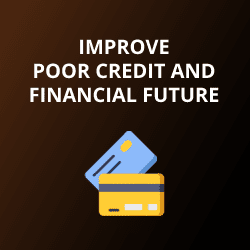Our economy has been running on credit nowadays. That’s why many institutions, not only financial institutions but also insurance companies and other businesses, have been looking at our credit information to ensure we have good credit before being granted any financial product.
If you have a bad credit score, you’ll likely face negative consequences. For example, you’ll be subject to high-interest rates, higher insurance premiums, and a lower approval rate for a lease.
Get your credit back into shape before it’s too late. Here are some ways to improve your credit and ensure a better financial future.

Borrow What You Can Afford
Avoid overusing your credit card because it’ll likely give you credit trouble and excessive debt.
Instead, make it a habit to charge what you can afford.
The same goes when taking out loans.
Even if you’re qualified for higher loan amounts, stick to what you can afford.
Before borrowing, be sure you’ll be able to pay off the debt in full on top of your current outgoings.
That means you should have income on an ongoing basis to repay, you’re aware of your cash flow, and you’ll be able to cut back your budget to afford your debt.
Borrowing what you can afford makes you a responsible borrower.
This good habit will reflect on your credit history, leaving a good impression on your future lenders or creditors.
Pay Bills Timely
Another factor that impresses lenders and creditors is good payment history.
The proof of repayment is the main reason why it makes up 35% of your credit score and is a crucial factor in its calculation.
One way to have a creditworthy payment history is to pay your bills on time.
There are several ways to ensure you’ll be able to pay on time.
First, set up autopay.
Doing so is especially helpful if you keep missing paying recurring bills.
Just be sure that you have enough money in your account to cover your bills before your bank does the work for you.
Otherwise, you’ll end up paying more fees.
Another is to change the due dates of the bills that have to be paid on similar dates.
You’ll likely be tapped out if you pay multiple bills around the same time, which can lead to a severe cash flow problem.
What you want to do is to spread them throughout the month to shore up your monthly finances.
Lastly, be upfront about your ability to pay.
Most lenders and credit card issuers offer alternative payment plans, especially when experiencing financial hardship.
These plans can lower your monthly or interest payment for a period.
Contact your creditors before missing a payment and ask what alternative payment option they can offer.
Use No More Than 30% of Your Credit Limit
After payment history, the next most crucial factor in calculating your credit score is your credit utilization ratio (CUR).
It’s calculated by dividing your debt by your total available credit.
If your CUR is high, your credit score will be low.
Hence, most experts advise keeping your utilization ratio below 30% to maintain a good credit score.
Pay your outstanding balances more than once a month.
Once every billing cycle, your credit company reports your statement balance to the credit bureaus.
The bureaus use the report to calculate your CUR.
So if there are two or more debt payments in a month every time the bureaus check your information, you’re likely to have a lower credit utilization rate, which translates to a good credit score.
Also, request a higher credit limit if you spend more than 30% of your total limits.
Before calling your card issuer, clear some of your outstanding credit card balances, and make sure your income has increased.
More importantly, stick to your budget because a higher threshold will let you spend beyond your means.
Avoid closing your credit cards at all costs.
Doing so means getting rid of a specific limit from your total available credit.
As a result, your utilization percentage will increase, and your credit score will have an immediate negative impact.
Consolidate Debts
If you’re having a hard time paying off large credit card bills or loan payments, opt for a debt consolidation loan.
It’s a personal loan issued by banks, credit unions, and online lenders, such as CreditNinja, where all of your debt is rolled into one monthly payment.
Consolidating your debts can reduce your credit utilization.
However, since it’s a personal loan, rather than being a revolving credit like credit cards, it’s considered an installment loan.
Hence, it’s not included in your utilization rate.
Final Thoughts
Time is of the essence when you want to improve your credit score.
After taking steps to turn your credit health around, it could take several weeks or even months before you see a noticeable impact on your score.
That’s why the sooner you start, the better you’ll see results.



